WAR CRY



Police officers are back on duty in ITV drama
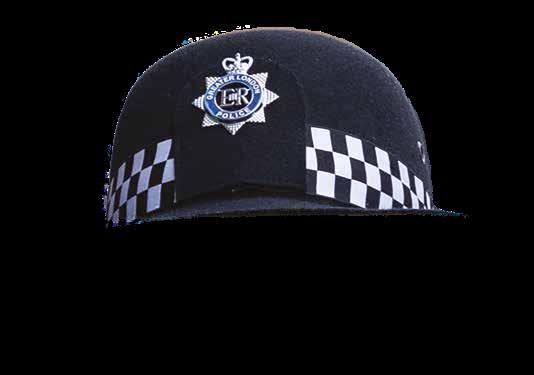



The Salvation Army is a Christian church and registered charity seeking to share the good news of Jesus and nurture committed followers of him. We also serve people without discrimination, care for creation and seek justice and reconciliation. We offer practical support and services in more than 700 centres throughout the UK. Go to salvationarmy.org.uk/find-a-church to find your nearest centre.
The Salvation Army first published a newspaper called the War Cry in London in December 1879, and we have continued to appear every week since then. Our name refers to our battle for people’s hearts and souls as we promote the positive impact of the Christian faith and The Salvation Army’s fight for greater social justice.
Issue No 7642
Editor: Andrew Stone, Major
Deputy Editor: Philip Halcrow
Production Editor: Ivan Radford
Assistant Editor: Sarah Olowofoyeku
Staff Writer: Emily Bright
Staff Writer: Claire Brine
Editorial Assistant: Linda McTurk
Graphic Designer: Rodney Kingston
Graphic Designer: Mark Knight
Email: warcry@salvationarmy.org.uk
The Salvation Army United Kingdom and Ireland Territory 101 Newington Causeway London
SE1 6BN

Tel: 0845 634 0101

Subscriptions: 01933 445445 (option 1, option 1) or email: subscriptions@satcol.org
Founder: William Booth
General: Lyndon Buckingham
Territorial Commander: Commissioner Anthony Cotterill
Editor-in-Chief: Major Julian Watchorn
THIS weekend heralds the last bank holiday before Christmas for people living in England, Wales and Northern Ireland. So, the weather forecast for the next few days may be watched more closely than usual as they hope for some good weather.
Certainly those going to the many festivals taking place will want to be needing their suncream more than their wellies. In this week’s War Cry we report on the history of one such festival – Greenbelt, which is celebrating its 50th anniversary this year.

Set in some fields in Northamptonshire, Greenbelt brings together thousands of people to celebrate music and the arts, encouraging them also to think about social justice and the Christian faith.

‘We have music, comedy, theatre and visual arts,’ says Paul Northup, the festival’s creative director in an interview. ‘We have panels and speakers looking at issues of social justice and activism. Together, the arts, faith and justice are what make up Greenbelt’s DNA.’
Paul describes how the festival engages with current social issues. This year, he says, there will be a particular focus on the cost of living.
‘It’s a huge issue for us all at the moment,’ he tells us. ‘This year we’ve invited a number of people with experience of poverty to come and share their stories with us, thereby challenging individuals and churches on how they can respond more effectively to this situation. It’s a problem affecting the whole country.’
Churches have a long history of taking action to help people who are facing tough situations. This week we also look back on the 1963 Bristol bus boycott and the discrimination faced by people of colour back then and since. As we speak to two church leaders, we discover the role the Church has played in the quest for justice.

Although the Church has sometimes got things very wrong, valuing and treating all people fairly is at the heart of the Christian message. And the offer of a new and eternal life is available to us all, whoever we are.

LIFE on the force is not for the fainthearted – especially when someone is returning to work after being under investigation. PC Lizzie Adama must hold her nerve in The Tower 2: Death Message, which begins on ITV1 on Monday (28 August).

The young copper (Tahirah Sharif) had been the subject of a police inquiry into an incident at Portland Tower in which another police officer and a teenage girl fell to their deaths. At the start of this second series, the verdict comes in. PC Adama is cleared of misconduct and is back at Farlow police station, ready to carry out her duties.
homicide and assigned a cold case – the death of Tania Mills, who went missing in 1997.
On the homicide unit, Sarah bumps into her former partner in solving crime Detective Constable Steve Bradshaw (Jimmy Akingbola). It’s a surprise to both detectives, whose relationship took a hit during the inquiry. Sarah felt betrayed when Steve told Lizzie how to get through an interview and save her career.
She remains under the oversight of Detective Inspector Kieran Shaw (Emmett J Scanlan), who backed her in the inquiry. But Kieran and Lizzie were also having an affair, so while her return to his station is welcome, they must temper their feelings for each other. And that may prove a challenge.

Detective Sergeant Sarah Collins (Gemma Whelan), who had led the inquiry into the Portland Tower incident, is also facing a challenge. She has been moved to
As the four police officers try to move forward with life, they find that they cannot easily shake off recent events. Mistakes, betrayals and trauma all linger. But what they do with the remains of the past will have a bearing on people’s present.
Writer and series executive producer Patrick Harbinson says one of the reasons he named the continuing drama The Tower is that Portland Tower ‘is still part of their lives: it looms over them, metaphorically and literally’.
That sense of an event looming over someone is not consigned to the small screen. Some of us may have a ‘tower’
in our own lives – something that we regret or that was traumatic. It can feel as though we are unable to escape it and the guilt, fear or pain may stop us from moving forward as it casts a shadow over everything we do.
It’s an age-old experience. The Bible recounts the details of many people who had their past hang over them. One such person was Paul. He persecuted the early Church, but later became a follower of Jesus himself. He discovered the truth that he did not have to live with the regret or shame of the wrongs he had done, but instead he could receive forgiveness and be free from the past.
He went on to share the message with others of how Jesus brought him God’s forgiveness. ‘Now the case is closed,’ he wrote. ‘There remains no accusing voice of condemnation against those who are joined in life-union with Jesus’ (Romans 8:1 The Passion Translation).
If we turn to Jesus, the verdict is in. Whatever we have done doesn’t need to hang over our heads. While we may face natural consequences, we can live with true internal freedom in the present and have hope for the future.
AFTER fatal wildfires swept across the Hawaiian island of Maui, The Salvation Army was quickly co-ordinating and providing more than 7,000 meals a day at shelters that had taken in people who had fled their homes.
When The Salvation Army’s Lahaina Lighthouse church buildings were destroyed, the centre’s leader, Envoy Kevin Nagasaki, carried on supporting islanders by working at other locations.
The Salvation Army’s leader for Hawaii, Major Troy Trimmer, said: ‘In time, we will rebuild our buildings, but right now our main focus remains serving those on Maui by not only co-ordinating and providing meals, but also by providing emotional and spiritual care.’
A STAR of reality TV show Geordie Shore who turned to God after drinking took a toll on her mental health has celebrated 12 months of being sober, reported Mail Online.

Faith Mullen, who appeared in the long-running MTV series and also recently in BBC3’s Go Hard or Go Home, shared a post on Instagram, reflecting on her one year of being sober.
The 23-year-old said in a caption that 12 months ago she woke up, having blacked out from drinking the night before, and knew that she needed to change. She recounted years of struggles caused by her excessive drinking, including ruined relationships and poor mental health.
‘God got me back into the church I’d grew up in,’ she wrote, after explaining that she had also attended AA meetings. ‘The only way I could fight the demon drink was in my Lord’s house. I can’t believe how much he has healed me in a year, I am secure in who I am in him … 365 days since I last abused alcohol or took illegal substances, I am standing here today as a testament to what God can do.’

A TENPIN bowling league for people with learning disabilities that is supported by The Salvation Army in Sunderland has celebrated the end of a successful season.
Part-funded by The Salvation Army in the Southwick area of the city, the league offers a safe environment for participants to have fun, exercise and meet new people.
Peter Lovegrove, a Salvation Army member who runs the group, said: ‘I was coaching children on how to bowl and, after speaking to adult services, had the idea of developing a league for vulnerable adults, people with learning disabilities, additional needs or struggling with mental health. We’re at about 30 members now.
‘It’s such a good way of bringing people together. The social side of it is really important. They spur each other on. If they get a strike, everyone is cheering, high-fiving each other, running laps of the bowling alley.’
The league is run as part of The Salvation Army’s Enabled programme, which provides spiritual and social fellowship for people with disabilities and their families and carers.
A CAMBRIDGESHIRE church has installed a stained-glass window featuring scenes from the Covid-19 pandemic in what is thought to be a UK first, BBC News reported.
St Mary and St Andrew’s Church in Whittlesford commissioned the £20,000 artwork, which features doctors working in PPE and a woman delivering shopping to an elderly man, to celebrate the 1,000th anniversary of the church being built.
The Rev Alasdair Coles explained that the idea came about in the autumn of 2020, during the height of the pandemic.
He said: ‘We decided very quickly to make the theme of it about caring, to honour the caring people that we’d seen during the pandemic, both professionally, but also by people in the village who were looking after one another.’
On 28 August 1963, the Bristol Omnibus Company announced it would no longer refuse to employ people of colour. The decision came after four months of what is known as the Bristol bus boycott, in which thousands of West Indians in the city did not ride the buses in protest at the discrimination they were experiencing. To mark the 60th anniversary of the event, Canon Dan Tyndall of St Mary Redcliffe Church talks about the stained-glass window which commemorates it, and Bishop Dexter Edmund reflects on the role that faith played in his community’s quest for justice
Feature by Sarah OlowofoyekuAPLAQUE at Bristol’s bus station commemorates an event that took place in the city 60 years ago and had national repercussions. Just under two miles away at St Mary Redcliffe Church, a soon-to-be-unveiled panel on one of its stained-glass windows depicts the same event.
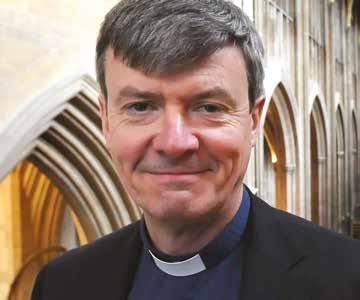
In 1955 the Bristol Omnibus Company voted to ban non-white bus drivers and conductors. Some years later Paul Stephenson, Owen Henry, Roy Hackett and others formed the West Indian Development Council. Paul, a youth worker, helped set up a job interview for a young person, Guy Reid-Bailey, at the Bristol Bus Omnibus Company. When Guy attended, the manager told him that
he ‘couldn’t employ blacks’. Guy and Paul returned to protest, but the manager would not budge. So, Paul called a boycott, which began on 30 April 1963. That day, the estimated 7,000 West Indian residents of Bristol refused to ride buses. They did the same the next day and the next. Days became weeks, and weeks became months.


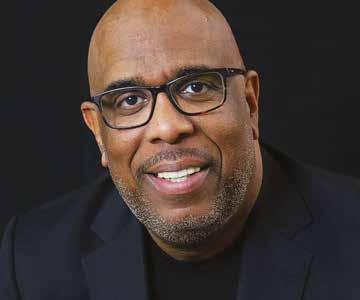
On 28 August 1963, after nearly four months of the boycott, marches and media attention, it was announced that there would be no more employment discrimination on the buses in Bristol. In September of that year, a Sikh, two Jamaicans and two Pakistanis were employed by the company. Two years later, the 1965 Race Relations Act was
passed by the government, which made racial discrimination in public places illegal. A further three years later, racial discrimination in employment and housing was declared unlawful.
Sixty years on, the bus boycott has now been commemorated in artwork across the city, including a window at St Mary Redcliffe Church. The four-panel stained-glass window, which will be officially unveiled as part of a city-wide event marking the anniversary of the boycott, depicts Jesus in scenes with oppressed and diverse people. The window’s art came about as a result of a competition held by the church
Turn to page 6 f

From page 5
to find a replacement for a window commemorating local charity donor and slave trader Edward Colston, which was taken down in 2020 after protesters toppled a statue of Colston in the city.
Winner Ealish Swift’s design was the popular choice among the professionals and the wider community, as the church’s vicar, Canon Dan Tyndall, explains.
‘The idea of having Jesus depicted in four different ethnicities, none of which were white, was commented on a lot,’ he says. ‘The four scenes themselves were just so thoughtful: Jesus calming the storm in the middle passage of slavery, the Bristol bus boycott, a migrant boat crossing – which is so pertinent to now –and a diverse group of people standing in front of the suspension bridge.

‘For me, the bridge scene is reminiscent of the Bible’s Book of Revelation –standing by the waters, the healing of the nations. Across the four windows, we have the question: “And who is my neighbour?” It enables us to tell the story of the Edward Colston window and the horrific truth of our involvement in the transatlantic trafficking of enslaved Africans, as well as the story of how our understanding of what it means to be a good neighbour has been shaped by the global village we now live in.’
As Dan leads his congregation in reckoning with the past, he reflects on the effect that the boycott had on racism in the UK.
‘There were other protests around the country at the same time, but the Bristol bus boycott is the one that is spoken about, not just locally but more universally, that led to the Race Relations Act of ’68, and it clearly had a massive impact. But I think it also formed the beginnings of racism going under cover, ending up with the Macpherson report of 30 years ago and the Casey report into the Met this year. Racism has become more insidious and plays out in ways that you can’t see
The stained-glass windows designed by Ealish Swift for St Mary Redcliffe Church depict Jesus as part of the Bristol bus boycott, on a migrant boat, in the community in Bristol and calming the storm on a slave ship

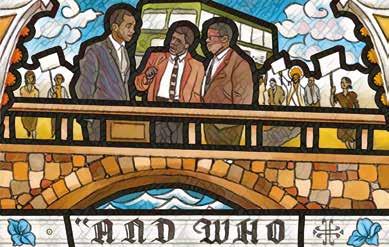


openly, but that are just as painful, hurtful and obnoxious.’
Twenty years after the success of the boycott the West Indian community in Bristol was still facing discrimination. In 1985 Guy Reid-Bailey, whose experience of employment discrimination sparked the bus boycott, partnered with Bethel United Church to form a housing association.
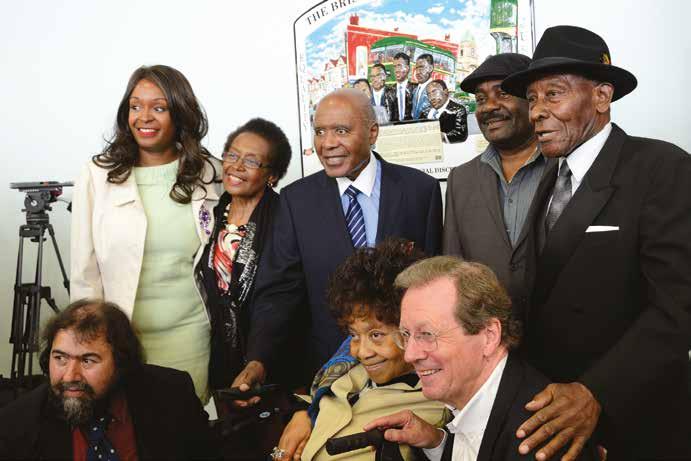


Bishop Dexter Edmund, who leads the church today, recalls: ‘My father, Bishop Gerald Edmund, was a person that was sensitised to things in the community. The very first meeting before the United Housing Association was formed took place at Bethel United Church on Church Road, and connections were made with Guy Reid-Bailey.
‘There was a white lady, Sue Dawson, who was connected to the housing association movement, and she was instrumental in giving counsel to my dad to start what I believe was the first Blackled housing association here in Bristol. Many of us in our early 20s became part of that movement and attended meetings and became sensitised to the fact there was a need for good housing.’
In Bristol, as across many other parts of the UK, the church was about more than just an hour’s meeting every Sunday for the West Indian community.
‘Many of our parents and grandparents brought with them their faith that they hoped to continue to explore when they got to England,’ says Dexter. ‘When they went to Methodist churches and the Church of England, they were not welcomed. Ministers and vicars told them not to come back. So that gave them the impetus to form their own churches that were started in front rooms, bedrooms, schoolrooms. The church I pastor was started at the co-op hall in Newfoundland Road.
Thirty-five years after attending meetings with the United Housing Association, Dexter found himself close to the statue of Colston when it was pulled down during one of the anti-racism rallies of 2020.
‘There has been change, but things have not changed as much as people had expected,’ he says.
‘The church not only provided a great place to come and worship, but it also was where people would get information on where were the jobs and the houses, and there was an unofficial credit union system called “pardna”.
‘The tentacles of racism reach into everything. There was a struggle not only in employment, but also in housing. The church was at the forefront of helping in ways that were not always publicised. If a family needed help, oftentimes they went to the church before they went to the council. It was the first place people went to, because there was a distrust of the system.’
‘The older I get, the more patient I get. Doors of opportunity have opened for us, but it’s still challenging. We strive for liberation on all fronts.
‘Faith is important, because it allows us to have a better sense of understanding. There’s a passage of Scripture that says that if it is in this life alone that we have hope, then we would be people most miserable. We recognise that our hope is not in this world, not in systems, not in government. Our hope is in the Lord. He has made us promises in his word and our hope goes far beyond the pie-in-the-sky dream, it goes far beyond religion being the opium of the masses.
‘It really is a strong sense that we will live again, and while we’re living here, we’re to live in peace with our brothers and sisters and do our very best to make the world a better place.’
To mark the 50th anniversary of Greenbelt, which runs from Thursday 24 to Sunday 27 August, creative director PAUL NORTHUP reflects on the beginning of the arts, faith and justice festival – and considers its work for the future
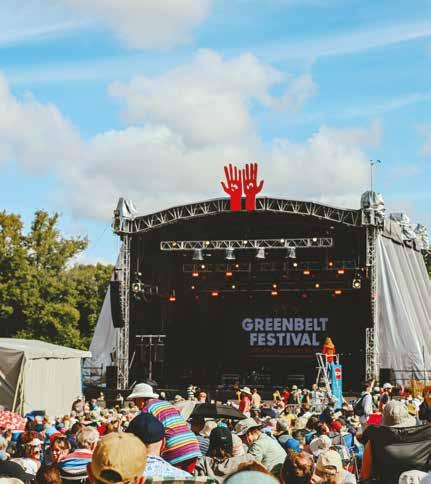 Interview by Claire Brine
Interview by Claire Brine
‘ABIT like a tiny version of Glastonbury, Greenbelt is a festival which celebrates music and the arts – but it also takes Christianity seriously,’ says its creative director, Paul Northup. ‘That doesn’t mean that there are 12,000 people walking round the campsite praying all the time. It means that everything we do at Greenbelt is informed by the values and stories contained in the Gospels.
‘We have music, comedy, theatre and visual arts. We have panels and speakers looking at issues of social justice and activism. Together, the arts, faith and justice are what make up Greenbelt’s DNA.’
This week, thousands of festivalgoers will be dusting off their tents and rocking up to Boughton House near Kettering to celebrate Greenbelt’s 50th anniversary. The eclectic line-up includes musicians Laura Mvula and Ezra Furman, economist and debt-relief activist Ann Pettifor, comedian Milton Jones and the former

prime minister Gordon Brown.
‘In terms of speakers and performers, we are looking for individuals who are the best or most interesting in their field,’ explains Paul. ‘Not all of our special guests may share our Christian faith, but we usually overlap in terms of our values. Many of them, for example, share our commitment to social justice or to inclusion.
‘At Greenbelt, we are trying to bring our largely Christian audience into contact with some of the best thinking out there – the best activism, the best creativity, the most radical ideas in terms of justice. We want to create a space in which people feel safe enough to explore, encounter and ask questions. It’s not about establishing a place for people to reinforce what they already believe.’
Founded in 1974 by a group of young Christians, the first Greenbelt took place on a family farm in Suffolk – and was billed by
The Sun as ‘the nice people’s pop festival’. ‘That first event was basically a bunch of misfits together in a field,’ Paul says. ‘I think they came up with the idea after being influenced by a few things that were happening at the time. Firstly, in the 1960s, they had heard all about the hippy movement and seen the rise of the Jesus People movement in the States. Moving into the 1970s, new music festivals, such as Glastonbury, were being established, which the young Greenbelters attended.
‘Around the same time, they also learnt of a new musical called Lonesome Stone, which – like an early version of Jesus Christ Superstar – told the story of the life of Jesus. It was seen as radical, creative and edgy.
‘All these stimuli encouraged the young Greenbelters – who were very much rooted in their Suffolk chapel community – to think: “Hold on, why can’t we stage a
festival that allows us to explore our faith and other subjects creatively and perhaps even more expansively than we can in church on a Sunday?”

‘One of the group had a family farm. And that’s how Greenbelt started.’
Fifty years later, the festival has become an annual fixture in the calendar for thousands of Christians across the UK who are looking for spiritual enrichment and the opportunity to recalibrate their lives. Though the content of the festival has changed over its history, Paul believes that the heart of Greenbelt has remained constant.
‘As a festival, it has always been outward-facing,’ he explains. ‘And that means that some of the issues we have addressed over the years have ebbed and flowed. Greenbelt is constantly looking at what’s happening in the wider world and asking: “How do we engage here? What


Turn to page 10 f
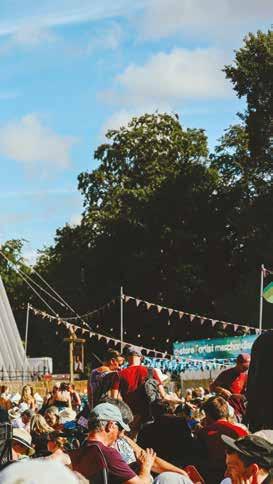
From page 9
‘But what hasn’t changed is the mixture of freedom, acceptance and love that animates the festival. The reasons we engage with certain issues, the way we want to be challenged, our vision in addressing these topics – I’d say all of that has remained utterly constant since our beginnings.’
This year, one of the hot topics up for discussion is the cost of living crisis.
‘It’s a huge issue for us all at the moment,’ Paul says. ‘This year we’ve invited a number of people with experience of poverty to come and share their stories with us, thereby challenging individuals and churches on how they can respond more effectively to this situation. It’s a problem affecting the whole country.’
Christians. We are called to be creative, because we are created.
‘Social justice is also important to us, because Christians aren’t content to just believe in a certain set of stuff. We want to act in response to situations that happen in the world and make a difference to the way in which we live.
‘And, finally, our commitment to the arts and social justice is underpinned and held together by God: a God who, we believe, made the world and loves us.’
On its website, Greenbelt outlines its mission as creating spaces where ‘the arts, faith and justice collide’.

Paul explains why these three things in particular are the festival’s focus.
‘We champion the arts because usually it is the artistic or poetic approach that unlocks deeper meaning and truth,’ he says. ‘Often we are taught facts or we learn to recite Bible passages in our traditions of faith – and all of that has value. But at Greenbelt we also believe that God is supremely creative and that creativity is fundamental to who we are as
While many people may see a natural connection between faith and the arts or faith and social justice, the relationship between faith and politics is sometimes seen as awkward or problematic. At Greenbelt, however, such a match is encouraged. This year Gordon Brown and former leader of the Liberal Democrats Tim Farron are taking to the stage to share their experiences.
‘Greenbelt is about bringing things together and seeing the world with no splits in it,’ says Paul. ‘The Christian view is that God made the world – and this is it. Parts of it are in a mess. Parts of it need redemption. Parts of it are doing better. But there is one world and to try to hold it apart, particularly when it comes to faith and politics, is impossible.
‘When we invite politicians to speak on our stages, they have to be accountable to their ideas, to their lives and to our
audience. If they have an hour to give a talk, I ask them to speak for no more than 35 minutes, so that there’s plenty of time for a Q&A afterwards. It’s important that festivalgoers have the chance to ask questions and to challenge these people. They need to be open to scrutiny.’
Although Paul speaks openly about the Christian origins of Greenbelt, it’s notable that the festival website makes little mention of God or Christianity.
‘It’s a deliberate choice,’ he says. ‘The reason we avoid some of the churchy vocabulary is because sometimes it puts up more barriers than it builds bridges. If Greenbelt was a church, we’d have the time to model our beliefs week by week and build relationships with people. But we don’t have that. Greenbelt is one weekend a year. And I would rather people come to us than feel put off by certain words that may have negative connotations for them.
‘People might disagree, but I don’t feel that our online presence is disingenuous. Everyone is welcome at Greenbelt –whatever their background or level of belief. And they will always be able to find sessions that they can engage with on our programme.’
One particular act that proved popular at the festival in recent years was Pussy Riot, the punk activists from Russia, who appeared in 2018.
‘Given all that’s unfolded in their country since then, I’m really proud that we platformed them when we did,’ reflects Paul. ‘They were so brave to stand up to
the state, and, as a result, I found their performance incredibly moving.
‘Other standout Greenbelt guests for me include Sinéad O’Connor and Mavis Staples from the Staple Singers. Mavis had real star quality and such deep-seated belief. Her gospel voice was just “wow”.’
Given that not all the performers or speakers at Greenbelt profess a Christian faith, is God always the focus of the festival? How do audiences encounter him if references aren’t always explicit?
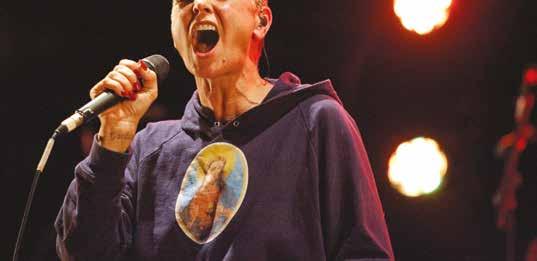
‘Rather than God being the focus of Greenbelt,’ says Paul, ‘I think the focus is on what the light of God enables us to see. For example, a Christian writer can write about two things: they can write directly about God, or they can write about what God shows them. Greenbelt – I would
say – is focused on what God enables people to see, but that doesn’t mean that we aren’t focused on God too, because, by inference, I believe we are.
‘On our website, we talk about standing for a “progressive Christian faith”. What we mean by that is that we read the Bible and we take it seriously, but we don’t read all parts of it literally. Some of it is poetry and prophecy. That doesn’t mean it’s not true. We believe it is true, but it’s not like a straitjacket. I see the Bible as poetic, prophetic inspiration that shapes how we live.’
After talking about a number of Greenbelts past, Paul raises the three topics which he believes the festival needs to address as a matter of urgency.
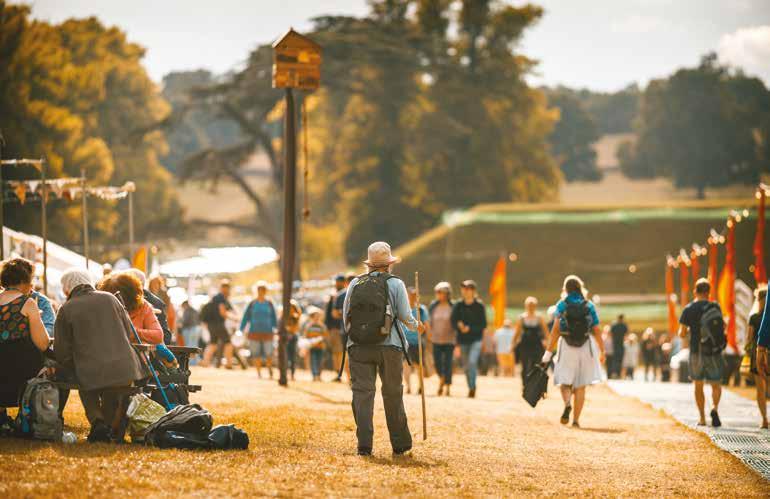
‘Firstly,’ he says, ‘the Church, as an

institution in the West, is dying more rapidly than any of us realise, and spaces such as Greenbelt are going to become increasingly important for people who want to hold on to their faith in a communal setting. So one challenge is how we provide places of inspiration for people who want to continue with their Christian commitments.
‘Secondly, the climate emergency presents us all with an existential crisis – one which we are not as awake to as we should be – and folded into that is the problem of migration. I feel that the refugee crisis is only going to get worse as parts of the world become more and more uninhabitable.
‘Finally, I look at the younger generation for whom democracy is not working. As people of faith, we need to ask ourselves: “If the Church is dying, if we are facing an existential crisis and if democracy isn’t working, how are we, as Christians, going to organise ourselves to make a difference? How do we live in love and live in hope?
‘These are big challenges for us all in the years to come – and I think Greenbelt has a lot of work to do in response.’
l For more information visit greenbelt.org.uk
THE War Cry invites readers to send in requests for prayer, including the first names of individuals and details of their circumstances, for publication. Send your Prayerlink requests to warcry@salvationarmy.org.uk or to War Cry, 101 Newington Causeway, London SE1 6BN. Mark your correspondence ‘Confidential’.

There is no set formula to becoming a Christian, but many people have found saying this prayer to be a helpful first step to a relationship with God
Lord Jesus Christ, I am truly sorry for the things I have done wrong in my life. Please forgive me. I now turn from everything that I know is wrong.
Thank you that you died on the cross for me so that I could be forgiven and set free.
Thank you that you offer me forgiveness and the gift of your Holy Spirit. Please come into my life by your Holy Spirit to be with me for ever.
Thank you, Lord Jesus.
Amen
PEOPLE move house for many reasons. Whatever the motivation, moving always involves new beginnings and these can sometimes prove more difficult than expected.

One thing new arrivals in a street may worry about is whether they will get on with the neighbours. At our last house we hardly ever saw anybody, initially because of lockdown and then because they were at work all day. This time we are surrounded by neighbours in retirement flats – but that doesn’t automatically mean that we will connect as friends.
At our age, finding a good-quality doctor’s surgery is a top priority. I’m glad to say that we are now well blessed in that.
There may also be a new church or clubs to find, as well as shops, hairdressers, libraries, bus routes, the all-important local tip, parks … plus anything else you can think of. Slowly but surely, life begins to settle down to a routine and you can begin to enjoy your new environment.
One Bible writer said: ‘There’s an opportune time to do things, a right time for everything on the Earth’ (Ecclesiastes 3:1 The Message) – which I hope includes moving house, as that’s something people were doing at the time he wrote.


However, the opportune time doesn’t have to be about a big life event such as moving. It can be about any time we decide to break a bad or harmful habit or put past wrongs right, perhaps by saying ‘sorry’ after a quarrel or rebuilding a family relationship.
The Bible has lots of stories about people who decided to make a change. Take rich, powerful and unpopular Zacchaeus, for example. And the unnamed woman with a colourful history who avoided sneering neighbours by collecting water from the village well at the hottest time of day. Jesus helped both of them – not by condemning their past, but by offering them the opportunity to start to live as God wanted them to.
Whoever we are and whatever our circumstances, God is ready and willing to help us make a fresh start.
Is it time for us to move on?
Address
1 2 3 4 5 6
In which part of the human body is the tibia?
According to the proverb, a watched pot never does what?

Which surrealist artist painted Christ of Saint John of the Cross?
Who played Eve Polastri in the TV spy drama Killing Eve?
How many players make up a hockey team?
Which Grammy-winning singer is nicknamed Queen Bey?
 Feature by Claire Brine
Feature by Claire Brine
NOTTING Hill Carnival will be bursting into life with dancing and an array of colourful costumes today (Saturday 26 August). Over the bank holiday weekend, more than a million visitors will gather in west London, ready to embrace a multicultural mix of tunes.

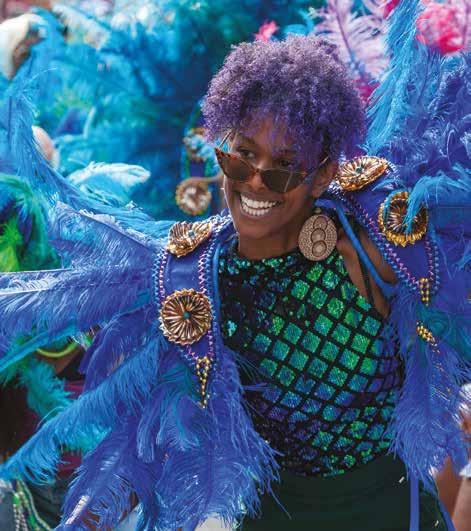
First held in 1966 as a means to ease racial tensions, Notting Hill Carnival has flourished over the years to become a national celebration of Caribbean culture and history. As glittering performers parade their way through the streets, spectators are invited to get their groove on by boogieing to the beats of the steel and calypso bands, and to treat their tastebuds to some of the finest international dishes, including Jamaican jerk chicken and Trinidadian roti.
EastEnders actor Colin Salmon, who is an ambassador for the carnival and a long-time member of the UFO Steelband, feels that the annual event is key for raising people’s spirits in the community.
‘The carnival is about the joy of music,’ he tells the War Cry. ‘Whoever you are, you’re accepted. You are included. You are enough.
‘There is also something about the music and the ability to express yourself which acts as a full stop, so that you can start a new paragraph in your life. For me, the carnival represents that moment of: “That part’s done. It’s the end of a chapter. Let’s start the next one.”’
Whatever our year has looked like so far, there are times when we could all do with making a fresh start. Perhaps we carry guilt about our past mistakes or are feeling flat after a period of being hurt.
There is good news. The Bible tells us that finding a new direction is always possible – because when we allow the love of God, as revealed by Jesus, into our heart, our whole outlook can be transformed.
One Bible writer explained: ‘Anyone who belongs to Christ is a new person. The past is forgotten, and everything is new’ (2 Corinthians 5:17 Contemporary English Version).
If our life feels monotonous, it doesn’t have to stay that way. Love, peace and joy can be ours if we follow Jesus. We can always count on him through every chapter of life.
The music acts as a full stop
14. Remiss (3) 15. Chart (3) 16. Statute (3) 17.

Each solution starts on the coloured cell and reads clockwise round the number



1. Not damaged
2. Remove goods from a ship 3. Order not to do 4. Chemical element
5. Fastest pace for a horse 6. Large prawns, fried
INGREDIENTS



250g salted butter, softened, plus extra for greasing
300g self-raising flour
2tsp baking powder
2tsp ground ginger
250g light muscovado sugar
5 large eggs

150ml runny honey
4 pears, peeled, halved and cored
METHOD
Preheat the oven to 170C/325F/Gas Mark 3 and grease a deep 23cm round springform cake tin with butter. Sift the flour, baking powder and ground ginger into a mixing bowl and add the sugar, butter and eggs. Beat the mixture with an electric whisk for 4 minutes or until smooth and well whipped.
Spread the honey over the base of the cake tin and arrange the pears on top, cut-side down.



Spoon the cake mixture on top, spread level and bake for 40 minutes or until a skewer inserted in the centre comes out clean.
Leave the cake to cool for 20 minutes before turning out to cut and serve.

 Major Amy Reardon
Major Amy Reardon